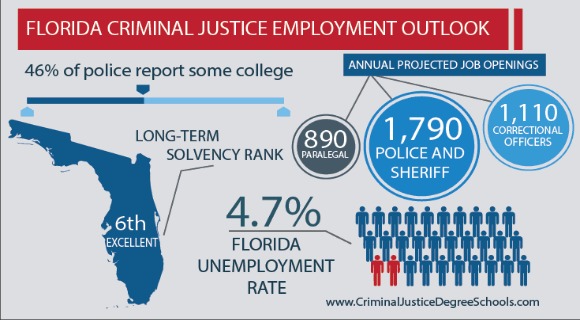FLORIDA TECH BLOG: Detective and Criminal Investigator Career and Salary Profile
By Florida Institute of Technology // September 28, 2017
LAW ENFORCEMENT DEMAND GROWING DAILY
ABOVE VIDEO: There is far more to being a police detective, crime scene investigator, or evidence tech than meets the eye.

BREVARD COUNTY • MELBOURNE, FLORIDA — Police detectives and criminal investigators work to apprehend lawbreakers, investigate criminal cases and solve crimes.
They may work for local, state or federal agencies, enforcing different aspects of the law. Completing a bachelor’s degree in criminal justice can be the first step toward a detective or criminal investigator career.
Job Outlook
The U.S. Bureau of Labor Statistics (BLS) projects that employment of detectives and criminal investigators nationwide will grow in coming years. Job growth will occur as the population expands and the demand for trained law enforcement specialists increases.
Competition for jobs is expected to be greater in state and federal agencies compared with local police departments.
Bilingual candidates with a college degree, military service or law enforcement experience – especially investigative expertise – should enjoy the best prospects.
Detective and Criminal Investigator Job Duties
ABOVE VIDEO: Being a police detective isn’t quite what you see on your favorite crime TV shows, with all the high-tech crime fighting tools, beating down the doors of criminals, and chasing bad guys. But it’s still a fascinating and rewarding career helping people by solving thefts, bank robberies, homicides and taking down drug dealers.
Criminal investigators and detectives – sometimes referred to as agents or special agents – gather facts for crime investigations. They compile evidence by observing suspects, interviewing witnesses and suspects, and examining physical evidence. If there is sufficient evidence, they will formally charge a suspect with a crime.
Detectives and criminal investigators often participate in arrests or raids. These law enforcement professionals usually specialize in different crimes, such as homicide, drug trafficking or fraud.
Detectives and criminal investigators must keep thorough records of investigations and maintain all pertinent documents. Preparing reports that detail their findings is a significant part of their work duties, as is collaborating with other departments and agencies to compare and exchange information.
Additional aspects of this profession include determining the scope, timing and direction of criminal investigations, and testifying in court or before grand juries.
Depending on the agency, a detective or criminal investigator may work in environments ranging from an office to a city street. Travel may be required, particularly for federal and state agency jobs. Whether on- or off-duty, detectives and criminal investigators are expected to exercise their authority if necessary.
Potential Salary for Detectives and Criminal Investigators
According to BLS data, the average annual salary for detectives and criminal investigators was $79,620 as of May 2015, with individuals in the highest 10 percent bracket earning 128,690 or more.
Recent graduates of bachelor’s degree programs will typically start out toward the lower end of the scale. Detectives and criminal investigators with experience and advanced education typically earn higher salaries.
Various factors can affect career opportunities and salary potential, including education, experience and local market conditions.
Education and Training

A career as a detective or criminal investigator often begins with police officer training. Typically, experience as a patrol officer for up to two years is needed before being considered for a detective or criminal investigator position.
Requirements vary depending on the department or agency, but many seek candidates with at least two years of college education. A four-year degree is preferred by many state and local agencies, and mandatory for most federal jobs.
You May Also Like: Choosing the Best Criminal Justice School
Police academy training may take from 12 to 14 weeks. Candidates must be U.S. citizens, meet specific age requirements, and have acceptable hearing, vision, agility and strength to be eligible for acceptance. Written examinations, relevant experience and education are usually considered by police academies when evaluating applicants for admission.
Individuals who wish to pursue police detective or criminal investigator work are usually required to undergo a background investigation and pass a physical fitness test. Some agencies also have mandatory drug testing.
The path to a criminal investigator or detective career can begin with a bachelor’s degree in criminal justice. Coursework typically includes criminal justice ethics, homeland security and terrorism, police organizations and administration, and community policing.
Employers should be confident that graduates of a criminal justice program are able to:
- Demonstrate a comprehensive understanding of the criminal justice process, from investigation and arrest to court and prison
- Apply legal concepts, including use of force, search and seizure, and due process
- Understand delinquency risk factors, diversion and prevention
- Study crime activity using tested techniques and methods, as well as new technologies
- Leverage advanced skills and knowledge
- Law enforcement agencies may offer opportunities for continuing education, making it possible for job candidates to gain an entry-level position with a bachelor’s degree and use tuition assistance to further their education.
What Skills Are Required for a Career as a Detective or Criminal Investigator?
Pursuing a career as a criminal investigator or detective requires integrity, a sense of responsibility, good judgment and physical fitness. Mental stability and discipline are also necessary to succeed in this challenging field, as are excellent communication skills and attention to detail.
If you possess these traits and have a desire to help keep your community safe from crime, a bachelor’s degree in criminal justice can put you on track for an exciting law enforcement career as a detective or criminal investigator.
CLICK HERE FOR BREVARD COUNTY NEWS















